Rebuilding Jamaica's Economy with a Gender Lens
Jamaican Businesses at Win-Win Webinar Series Agree that Gender Equality must be at the heart of Recovery effortsDate:
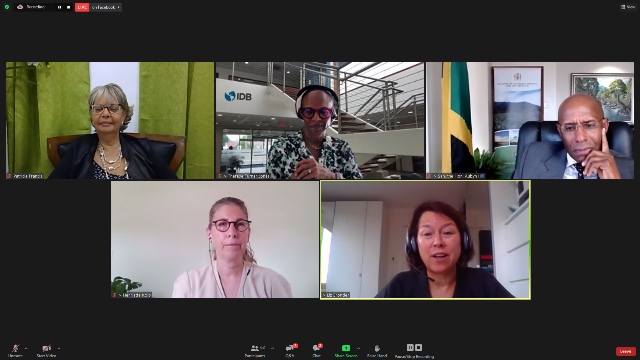
“Investments with a gender lens are important but they alone are not enough. Often times, financial institutions put credit lines in place, but they come and go. What is needed is business support advisory, and evidence. Often times, we are asked to focus on measuring the gaps and we continue to show the business case in everything, but sometimes I do get a little tired because nobody had to prove the business case for the status quo.”
Henriette Kolb, Manager, Gender and Economic Inclusion at the International Finance Corporation (IFC) in a recent address to the Jamaica business community stressed that too often women have to work harder to make their business case for financing. This was a recurring theme of the “Win-Win: Building Back Better!” Webinar Series held on June 15,16, 22 and 23, 2021 and organized under the “Win-Win: Gender Equality Means Good Business” programme, which concluded on June 30, 2021. The programme was created in a partnership with UN Women, the International Labour Organization (ILO) and the European Union (EU) to promote gender equality through the private sector.
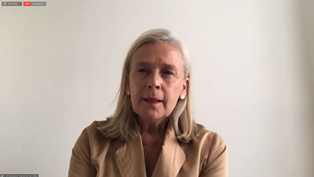
In the Caribbean, governments, the private sector and financiers have acknowledged that it cannot be business as usual if we are to build back better. The support to Micro, Small and Medium Enterprises (MSMEs) especially women-led businesses, inclusive value chains, and sustainable access to innovative financial resources are necessary for building a more sustainable, economically resilient and inclusive society. The webinar series brought together more than 70 government and business leaders daily, including the main moderator, Patricia Francis, Chair of the Trade Facilitation Task Force in the Government of Jamaica.
The over 45 local and international presenters (government ministers, heads of multilateral organizations, the private sector and financiers) called for more diversity in business and encouraged other key stakeholders to recognize and remove barriers to economic growth. Lessons learned and better practices were shared to address existing gender gaps in the workplace and to find new investment sources to reboot acceleration for MSMEs.
UN Women Multi-Country Office – Caribbean Representative, Tonni Brodber called on Jamaican financiers to revisit the criteria for viability. Pointing to evidence of return of investment (ROI) in women-owned enterprises and youth-owned enterprises, she shared an initiative to promote equality using the Women’s Empowerment Principles (WEPs) to generate more innovative financial instruments.
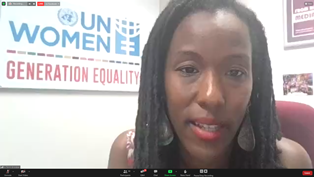
Brodber said: “Within the framework of the Win-Win Programme, UN Women has developed the initiative, ‘Investors for Equality’ as a space for dialogue between the different actors in the financial, investment and entrepreneurship ecosystem to raise awareness, mobilize investments with gender impact and generate a commitment to the principles involved in promoting gender-lens investments and gender equality within organizations in the financial sector.”
The UN Women report, The State of the Field of Gender Lens Investing is a tool for incorporating a gender analysis into financial analysis to get to better outcomes.
Brodber added: “Women control about $20 billion in consumer spending and generate about $18 billion, which widens their circle of influence. Women entrepreneurs generate 20% more income, even though 50% less is invested in them. As the programme’s name suggests, gender equality really means solid and sound business sense.”
Minister without Portfolio in the Ministry of Economic Growth and Job Creation, Senator the Honourable Aubyn Hill, reemphasized the potential financial benefits to the global and Jamaican GDP if participation and earned income gaps between men and women were decreased.
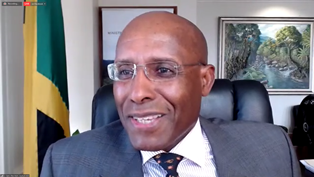
Senator Hill said: “Women locally earn 62% percent of every dollar earned by their male counterparts so more attention needs to be paid to equal pay for equal work. I hear you speaking to governments (for indeed we make policies); however, this issue of making pay equal between men and women must be addressed by CEOs and board members of large companies. They have to lead the way.”
Minister of Agriculture and Fisheries, the Honourable Floyd Green said government was tackling the challenges of participation gaps in the agricultural sector. Agriculture contributes 6.6% percent to local GDP. He explained more women were being engaged through the ‘Agriculture in Bloom’ programme.
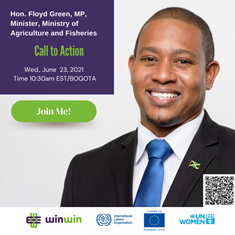
Minister Floyd Green said via video recording: “Women face traditional challenges such as access to extension services and land but also offer significant opportunities that when engaged, the data shows that they do much better in relation to productivity and retention of capital. That capital impacts the family and progress especially [in] rural communities, so we decided to dedicate the Ministry’s engagement to women in the agricultural sector.”
Financial Consultant, Development Bank of Jamaica, Audrey Richards implored financial institutions and investors to identify the “why” behind the low number of women being able to access capital from private equity investment and commercial banks.
During the panel discussion, The Road to Recovery – Inclusive Financing, Richards said: “When we move to more established business in Jamaica which are funded mainly by commercial banks, there is a lower percentage, 80% men compared to 20% women. For angel investing, just at the intake level, only 24% of applicants are women resulting in approximately 50% receiving investment. We must step back and identify how women come into the (entrepreneurial) system and identify whether or not there are barriers impeding women’s access to finance.”
Liz Bronder, Managing Director, Global Sustainable Finance, Bank of America compared the journey of the development of green bonds to the current stage of gender lens investing and highlighted how that model could inform the economic recovery for small island developing states (SIDS) with the support of Development Financial Institutions (DFIs), government policies and private sector players.
Bronder explained: “If you look at how the green bond market developed, it had a number of participants in that ecosystem: it had participants, standard setters, institutions that developed targets and indicators to measure success, institutions making commitments about how they would achieve targets and then the financial community stating that ‘we will lend you the money to ensure that you do achieve those targets’ and that is the same model that needs to be developed for gender bonds.”
Minister of Housing, Urban Renewal, Environment and Climate Change, the Honourable Pearnel Charles Jr. explained that Jamaica was also introducing innovative financing mechanisms and the need to do so with a gender lens: “We are creating a platform and a framework (for green bonds) for the private sector to lead in terms of transforming institutions and industries into resilient institutions and industries so that we (Jamaica) can withstand the impacts of climate change. This is happening right now because Covid-19 has taught us we are fragile, but we are also agile, and we can move forward by pinpointing the gender issues that identify our vulnerabilities.”
Watch the Recording for Day 1 of the Webinar Series
Watch the Recording for Day 2 of the Webinar Series
Watch the Recording for Day 3 of the Webinar Series
Watch the Recording for Day 4 of the Webinar Series
General Manager, Caribbean Country Department, Inter-American Development Bank, Therese Turner – Jones urged attendees to focus on the demands for economic recovery and identify possible threats to the gains made for women in the labour force such as the percentage of women in supervisory positions in Jamaica’s public and private sectors.
She said: “The lack of participation of women in the workplace was made worse by COVID-19, more so in developed countries; however, we should monitor this impact, especially since the participatory rates for women in the region was already lower than for men. Recovery will come in a couple of ways but primarily in two categories; by investing in resilient infrastructure such as renewable energy and investing in people.”
A sustainable and inclusive economic recovery will largely depend on how much more we invest in women. One business leader, Doug Hewson, Chairman, Portland JSX Limited acknowledged this importance by committing to the WEPs and becoming a signatory during the webinar series.
At UN Women, we are more committed than ever to attracting private sector investment, strengthening the ecosystem of gender-sensitive investments hand in hand with strategic partners who share this same vision and contributing to the generation of partnerships for the achievement of Sustainable Development Goal 5, mainly through the promotion of capital mobilization and investments enhanced by a gender lens.
Are you willing to join us and not miss out on this great opportunity?
Make your first step by committing to the Women Empowerment Principles (WEPs)
For further information, please contact:
Sheryl-Ann Thomas-Scott
Communications Analyst
UN Women Multi Country Office – Caribbean
1-3 Lady Musgrave Road, Kingston 5
Email: [ Click to reveal ]
WhatsApp: +1-876-463-4928
Sharon Carter-Burke
Communications Analyst
UN Women Multi Country Office – Caribbean
UN House, Hastings, Christ Church, Barbados
Email: sharon.carter-burke@unwomen.org
WhatsApp: +1-246-836-6124